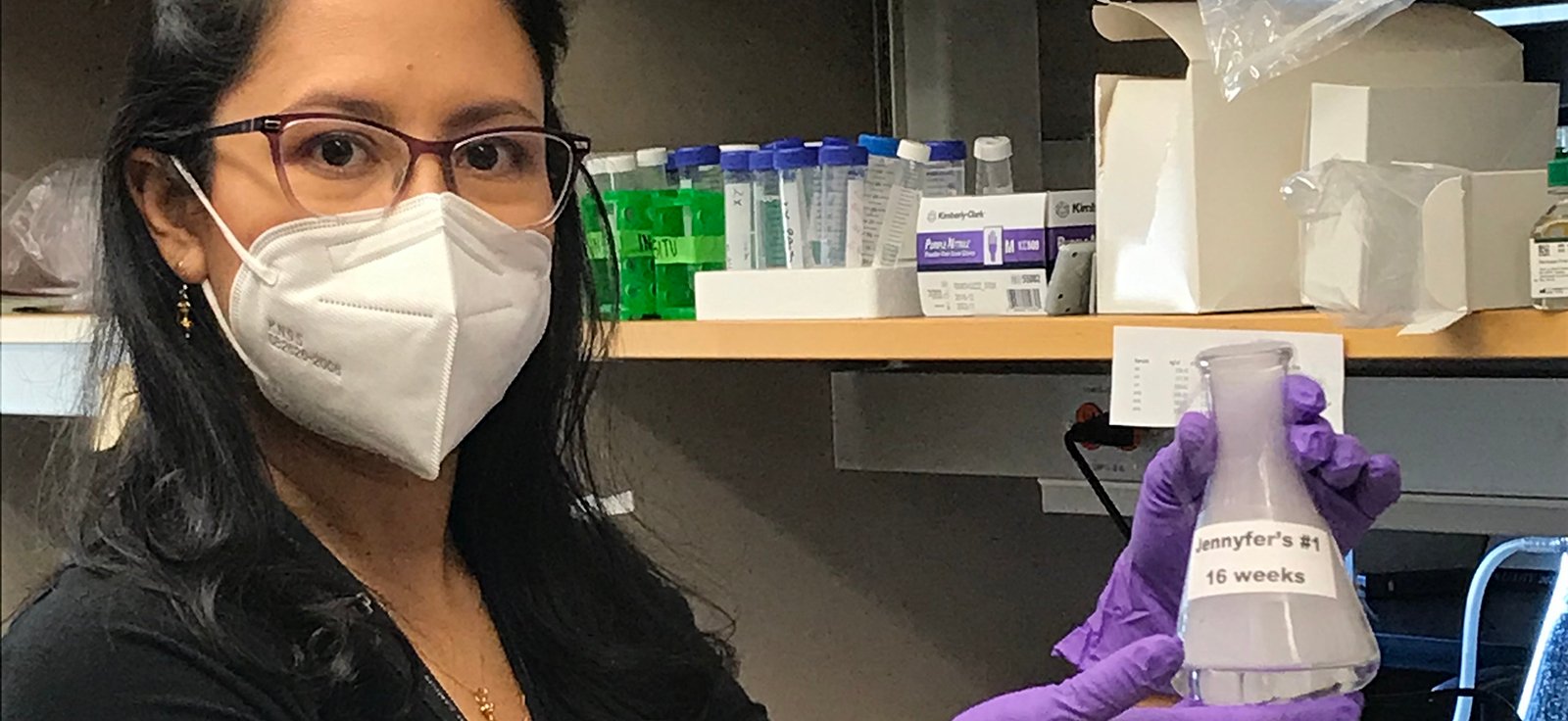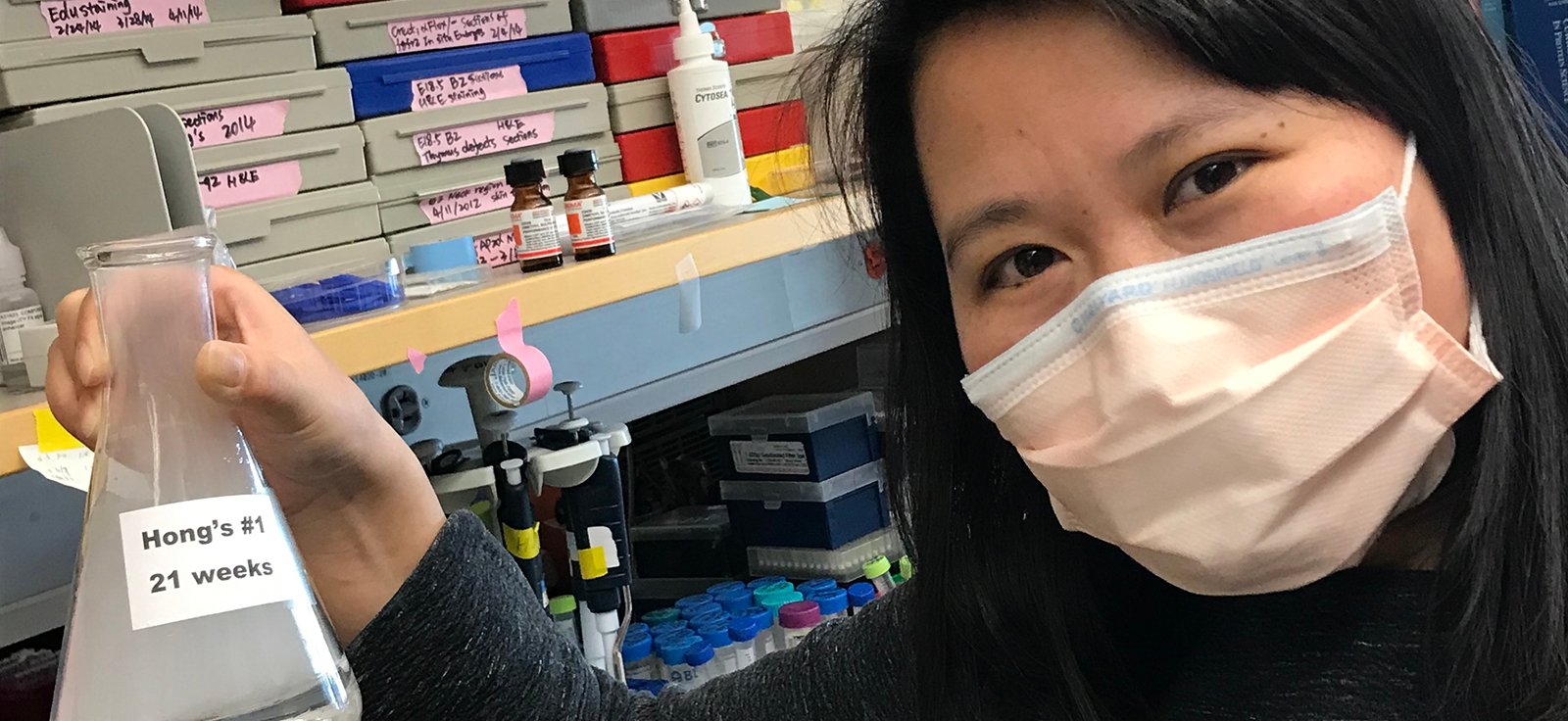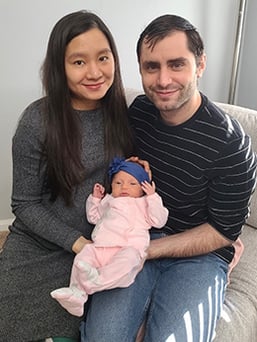Do you want a career, or do you want kids?
Many women in academia face this question at some point. And it doesn’t always come from nosy outsiders.
“We chose this career because of our ambitions. We want the work to get done, and we also want a family,” said Trisiani Affandi, PhD, from her hospital bed on the eve of giving birth to her first child. A postdoc in the University of Colorado School of Dental Medicine’s Department of Craniofacial Biology, Affandi shared her journey through pregnancy with two others in the department: postdoc Jennyfer Mitchell, PhD, and Hong Li, PhD, a research assistant professor.
|
Trisiani Affandi and her husband, Aaron, welcomed a healthy daughter, Lumen, on Jan. 9. |
A recent study found that pregnancy, maternity leave, and child-rearing are ongoing challenges for postdoc women nationwide. Bruce Mandt, PhD, assistant dean of the Graduate School and director of the Postdoctoral Office and Career Development Office, finds this unacceptable.
“Why do women in academia need to choose between their careers and a family? How can we, as mentors, as an institution, empower women to make the choice when it’s right for them, not just professionally convenient?”
Pregnancy during a pandemic
“Who thinks about having kids during a pandemic?” quipped Mitchell. “But because of the demands that science makes, you have to grab the opportunity when it presents.”
COVID-19 has influenced each woman’s pregnancy differently. For Mitchell, due in June with her first child following in vitro fertilization (IVF), the campus shutdown was an unexpected gift. Citing twice-daily injections with weekly ultrasounds and bloodwork, she said, “I wouldn’t have been able to keep up if I was trying to work normal ‘postdoc’ hours.”
For Affandi, COVID-19 changed the aftermath of her baby’s birth, as her family in Indonesia is no longer coming to visit. “We are hoping maybe this summer they can come.”
During Li’s second trimester, she had to keep a distance from her partner, who works at UCHealth University of Colorado Hospital occasionally caring for COVID-19 patients.
Likewise, doing science in a pandemic is challenging. Mitchell, fatigued from wearing a mask, said she works fewer hours. Shorter days and reduced campus access challenge experiment planning, and Affandi and Mitchell said they’ve become more strategic by necessity. Mitchell said, “I have to be methodical about the experiments I’m doing each week.”
And yet, Mitchell considers the reduced in-person workload under COVID a reprieve from the long hours in the lab postdocs often experience. After her IVF, she ended up with only one viable embryo. “We didn’t have the money, time, or capacity for physical stress to do more,” she said. “This was our only shot.”
Parental leave policies
When asked if she felt postdocs were made to choose between a career and a family, Mitchell said flatly, “Yes. Funding makes that choice for us.” Both Affandi and Mitchell are supported through federally-funded National Institutes of Health postdoctoral F32 fellowships, which provide eight weeks of paid leave for the birth or adoption of a child.

Postdoc Jennyfer Mitchell uses a beaker to illustrate how far along she is in her pregnancy. She is due in June with her first child following in vitro fertilization.
Faculty member Li, due in April with her first child, is relying on CU’s parental leave policy, which provides four weeks paid leave with the option to extend using vacation and sick time. Noting she had to write a grant to secure funding while dealing with morning sickness in the first trimester, she said, “Those late nights got me worried about the baby’s health.” Li also had to end a support staff position, a technician’s appointment, sooner than expected to cover lab costs during the shutdown.
For postdocs, parental leave is murkier waters, and a lot of questions remain unanswered. “A clearly defined leave policy would make it easier for postdocs to understand our options,” Affandi said.
Family-planning support
Beyond funding, work flexibility is critical for pregnant women in the lab. Affandi’s lab works with radiation, and she said her supervisor immediately limited her exposure.

Hong Li, a research assistant professor in the Department of Craniofacial Biology, holds up a beaker to illustrate her number of weeks pregnant with her first child.
All three women praised the support they’ve received from staff, students and faculty in their department. “Everyone has celebrated us, and they haven’t hesitated to give us a hand or a word of support,” said Mitchell.
In addition, Affandi noted the designated break rooms, fume hoods, and availability of emergency support as factors that created a safe environment. Mitchell lauded the abundance of nursing and lactation support on campus and the freedom to choose her health plan as a postdoc. “Access to reproductive medicine would not have been possible as a postdoc without help from insurance.”
Finding permission and power
For those considering starting a family, Affandi said, “If you feel like you’re ready, that’s what you do. It’s great if you have a supportive environment, but even if you don’t, there are people and resources that can help you at the department or institutional levels.”
So far, Li and Mitchell have not been placed in a position where they had to choose between family and their careers. After the babies arrive, all bets are off. “Things may change,” said Li.
Photo at top: Jennyfer Mitchell and Hong Li, along with their colleague Trisiani Affandi (not pictured) have navigated pregnancy in a pandemic by relying on department resources for support.


.png)
.jpg)
